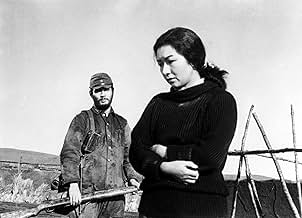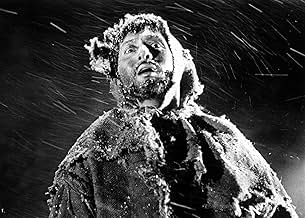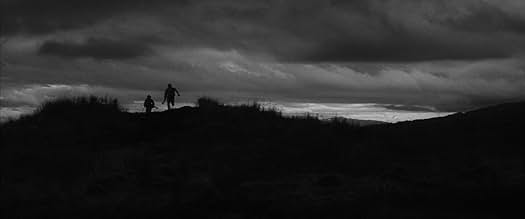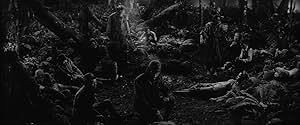La condizione umana: Parte III - La preghiera del soldato
Titolo originale: Ningen no jôken
VALUTAZIONE IMDb
8,8/10
8076
LA TUA VALUTAZIONE
Aggiungi una trama nella tua linguaHis ideals challenged by life as a conscript in war-time Japan's military, a pacifist faces ever greater tests in his fight for survival.His ideals challenged by life as a conscript in war-time Japan's military, a pacifist faces ever greater tests in his fight for survival.His ideals challenged by life as a conscript in war-time Japan's military, a pacifist faces ever greater tests in his fight for survival.
- Regia
- Sceneggiatura
- Star
- Premi
- 5 vittorie totali
Recensioni in evidenza
The Japanese troops are defeated by the Soviets and Kaji (Tatsuya Nakadai) heads with three survivors to South Manchurian expecting to meet his wife. Along their crossing through the enemy line in the Manchurian land, other Japanese survivors join Kaji's group, but they need to fight against the Chinese militias and the Soviets.
When they reach a Japanese village with women and one old man, a militia arrives in the place and Kaji and his men surrender to the Soviet to spare the women. The POWs are sent to a labor work camp and Kaji sees no difference between the treatment of the Japanese fascists and the Soviet communists, in which principles Kaji believed. He decides to escape from the camp to meet his beloved Michiko again.
"The Human Condition – Parts V & VI" is the last sequel of the heartbreaking anti-war masterpiece by Masaki Kobayashi. The story is impressively realistic and magnificently shot with top-notch camera work, giving the sensation of a documentary. I have seen many powerful movies about war, such as "Der Untergang", "Taegukgi hwinalrimyeo", "La Battaglia di Algeri", "Paths of Glory" and "Apocalypse Now" among others. But "The Human Condition" is certainly the most scathing antiwar movie that I have seen and I did not feel the 574 minutes running time in a black-and-white movie spoken in Japanese, Mandarin and Russian with English subtitles.
It is impressive to see the treatment spent by the fascist Japanese soldiers for the rookies and how Kaji grows-up and learns how his idealistic concept of communism is shattered when he becomes a POW and swaps his initial position of supervisor to the one of prisoner. The hopeless conclusion fits perfectly to this masterpiece and shows that in times of war, people are far from the condition for being human to survive. My vote is ten.
Title (Brazil): Not Available
When they reach a Japanese village with women and one old man, a militia arrives in the place and Kaji and his men surrender to the Soviet to spare the women. The POWs are sent to a labor work camp and Kaji sees no difference between the treatment of the Japanese fascists and the Soviet communists, in which principles Kaji believed. He decides to escape from the camp to meet his beloved Michiko again.
"The Human Condition – Parts V & VI" is the last sequel of the heartbreaking anti-war masterpiece by Masaki Kobayashi. The story is impressively realistic and magnificently shot with top-notch camera work, giving the sensation of a documentary. I have seen many powerful movies about war, such as "Der Untergang", "Taegukgi hwinalrimyeo", "La Battaglia di Algeri", "Paths of Glory" and "Apocalypse Now" among others. But "The Human Condition" is certainly the most scathing antiwar movie that I have seen and I did not feel the 574 minutes running time in a black-and-white movie spoken in Japanese, Mandarin and Russian with English subtitles.
It is impressive to see the treatment spent by the fascist Japanese soldiers for the rookies and how Kaji grows-up and learns how his idealistic concept of communism is shattered when he becomes a POW and swaps his initial position of supervisor to the one of prisoner. The hopeless conclusion fits perfectly to this masterpiece and shows that in times of war, people are far from the condition for being human to survive. My vote is ten.
Title (Brazil): Not Available
10ibts12
i had listened a lot about this movie but was unlucky that i had not seen this. This is a fascinating movie and i think that i am still feeling effect of the movie on my personality. I never imagined that even a movie can effect someone so much,and also there is feeling that what should be an excellent human condition ( as shown by Kaji and his wife) and what is prevailing human condition as we see around us. I have deep regards for all the crew of the movie who provided us a worth seeing and personality effecting movie. I dedicate all I have learned to the director of movie Masaki Kobayashi.
I have given the movie 10/10 because i find no point to deduct even a single mark. I recommend all serious movie viewers to kindly must see this movie and try to learn from it.
I have given the movie 10/10 because i find no point to deduct even a single mark. I recommend all serious movie viewers to kindly must see this movie and try to learn from it.
This trilogy was a grueling and rewarding. It was chilling to watch but I persevered. It was about the conflict between nationalism and the individual struggling for humanism. If you transfer yourself to post WW2 Japan you could see how powerful this film was. It was necessary for the soul searching that was to heal the results of the war.
It is as important today as it was then.
This trilogy affected me deeply after watching it.
There is hardly a frame in the ten hours that does not have any sub-text associated with it.
The ten hour film format has some merits maybe it will catch on.
It is as important today as it was then.
This trilogy affected me deeply after watching it.
There is hardly a frame in the ten hours that does not have any sub-text associated with it.
The ten hour film format has some merits maybe it will catch on.
If you have any remote interest in film go see this right away. Don't bother watching if you are too scared to attempt the entire 10 hours in one sitting. It's worth it and then some. The actor playing Kaji was terrific and each part turns out better than the last (everything really, the acting/camera work... all the bells and whistles just sound better the further in you get). It definitely struck me as something Adolfas Mekas would totally dig, which says a lot. This is a must see. If you decide to bring the wife and kids (or husband and mother-in-law or what- have-you) just be warned: this movie involves a fair amount of human suffering, on and off the screen. -Ed Hellman.
Lo sapevi?
- QuizIs the first Japanese movie in stereo.
I più visti
Accedi per valutare e creare un elenco di titoli salvati per ottenere consigli personalizzati
- How long is The Human Condition III: A Soldier's Prayer?Powered by Alexa
Dettagli
- Data di uscita
- Paese di origine
- Lingue
- Celebre anche come
- The Human Condition III: A Soldier's Prayer
- Luoghi delle riprese
- Rishiri-Rebun-Sarobetsu National Park, Hokkaido, Giappone(The final scene was shot on the Sarobetsu Plain.)
- Aziende produttrici
- Vedi altri crediti dell’azienda su IMDbPro
- Tempo di esecuzione3 ore 10 minuti
- Colore
- Proporzioni
- 2.35 : 1
Contribuisci a questa pagina
Suggerisci una modifica o aggiungi i contenuti mancanti

Divario superiore
What is the German language plot outline for La condizione umana: Parte III - La preghiera del soldato (1961)?
Rispondi






























